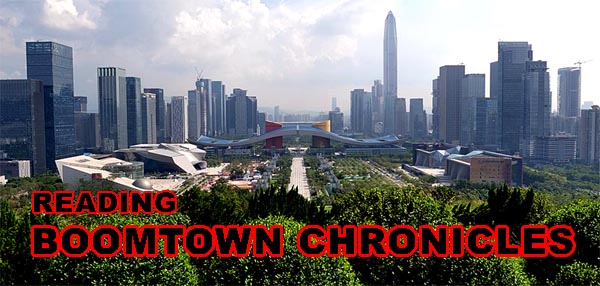 |
| Shenzhen, the Boomtown (Wikipedia) |
Note: Between Lesson #01-128 and #01-207, I wrote 72 lessons explaining expressions in articles published in the Shenzhen Daily. Read more about "Reading Boomtown Chronicles."
Get Ready: Who is the most talked-about "household name" in your household these days?
Boomtown Chronicles Part XIII - published Monday, September 8, 2008
- Title: "Yumin Village, the epitome of the SZ miracle."
epitome: a perfect example of something; the best in its class. You would never guess the meaning from its etymology: it means "a cut in the surface" of something. How does this add up?
Originally, an epitome was an abstract, or a short summary of a book or other work. So it was "cut" from the "top" or "surface" of a larger work, and represented a "surface" understanding of it. However, it was also supposed to present the essential meaning of that work, and could thus stand as a model for the whole work. So from saying the epitome represented the work to saying the epitome was "a fine example" of that type of work was a relatively small step.
Incidentally, the word is pronounced ee-PIT-uh-me, with four syllables.
- In 1980s China, Yumin Village was "a household name."
a household name: something that was commonly known. We also say, "a household word," meaning a word that is commonly used (perhaps even in every household). The later usage, "household name," would be the goal of many advertising campaigns. (A business owner would naturally be pleased if his product's name was mentioned in every household!)
- The story of Yumin Village is a "fairy tale."
fairy tale: usually, a story that's not true. But sometimes it refers to one that seems "too good to be true," like a romance that ends in a happy marriage. It can refer to something so wonderful that it seems like the happy ending of such stories.
- The household income of the Yumin villagers is compared to the "per capita" income of the average Chinese person.
per capita: for each person. "Capita" comes from the Latin word caput, meaning "head." We often find this Latin word's children in English: the capital city of any country is its "head" city; the chapters in a book are called that after the section "heading," and so on. Naturally, there is only one head per person, so "counting heads" is the same as "counting people."
- Yumin Village is "Now a luxurious living area..."
luxurious: extremely elegant, rich, etc. Today the word "luxury" is usually positive (although we still frown on too much luxury); but until the 17th century, it carried a negative connotation, connected to "sinful overindulgence." One obsolete meaning of "luxury" is "lust"!
--------
Read more: https://en.wikipedia.org/wiki/Shenzhen
Practice: Choose the correct term to fill in the blank in the sentence below:
- epitome
- fairy tale
- household name
- luxurious
- per capita
- Winning the championship was a ________ ending for many of the team's players.
- After he lost his job, Arnold could no longer maintain his ________ lifestyle.
- Webster's is the ________ of dictionaries.
- Since the pandemic began, Dr. Fauci has become a ________.
- The consumption of beef ________ is slowly decreasing in the U.S. (good news for cows!).
Answers are in the first comment below.
Submitted to the Shenzhen Daily for September 15, 2008


Answers to the Practice: 1. c; 2. a; 3. d; 4. b; 5. e
ReplyDelete